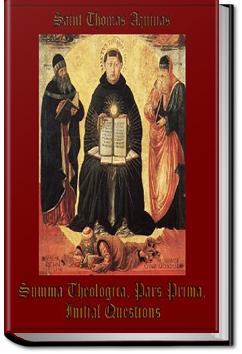UNLIMITED Audiobooks and eBooks
Over 40,000 books & works on all major devices
Get ALL YOU CAN for FREE for 30 days!
Summa Theologica - Part 1
Saint Thomas Aquinas
Book Overview:
The Summa Theologica is the most famous work of Thomas Aquinas (c. 1225–1274) although it was never finished. It was intended as a manual for beginners as a compilation of all of the main theological teachings of that time. It summarizes the reasonings for almost all points of Christian theology in the West, which, before the Protestant Reformation, subsisted solely in the Roman Catholic Church. The Summa’s topics follow a cycle: the existence of God, God’s creation, Man, Man’s purpose, Christ, the Sacraments, and back to God.(Summary adapted from the Wikipedia)
This is part one of the Pars Prima (first part, or volume), consisting of the Initial Questions.
The Summa Theologica is the most famous work of Thomas Aquinas (c. 1225–1274) although it was never finished. It was intended as a manual for beginners as a compilation of all of the main theological teachings of that time. It summarizes the reasonings for almost all points of Christian theology in the West, which, before the Protestant Reformation, subsisted solely in the Roman Catholic Church. The Summa’s topics follow a cycle: the existence of God, God’s creation, Man, Man’s purpose, Christ, the Sacraments, and back to God.(Summary adapted from the Wikipedia)
This is part one of the Pars Prima (first part, or volume), consisting of the Initial Questions.
How does All You Can Books work?
All You Can Books gives you UNLIMITED access to over 40,000 Audiobooks, eBooks, and Foreign Language courses. Download as many audiobooks, ebooks, language audio courses, and language e-workbooks as you want during the FREE trial and it's all yours to keep even if you cancel during the FREE trial. The service works on any major device including computers, smartphones, music players, e-readers, and tablets. You can try the service for FREE for 30 days then it's just $19.99 per month after that. So for the price everyone else charges for just 1 book, we offer you UNLIMITED audio books, e-books and language courses to download and enjoy as you please. No restrictions.
Reply Obj. 1: The cognitive faculty does not move except through the medium of the appetitive: and just as in ourselves the universal reason moves through the medium of the particular reason, as stated in De Anima iii, 58, 75, so in ourselves the intellectual appetite, or the will as it i. . . Read More
Try now for FREE!

"Love your service - thanks so much for what you do!"
- Customer Cathryn Mazer
"I did not realize that you would have so many audio books I would enjoy"
- Customer Sharon Morrison
"For all my fellow Audio Book & E-Book regulars:
This is about as close to nirvana as I have found!"
- Twitter post from @bobbyekat



Community Reviews
204 days. It's done. Well, I say it's done - I did skip or lightly skim over large swathes of it, and after about a third of the way through I started just ignoring the objections/replies as I found them confusing. Some parts made me cry 'Amen, brother' aloud; some parts were a real challenge to me
obviously i have not read all the volumes, but everytime i open them i am astoished at the depth and insights that he had. he is honestly on of my heros
One of my favorite books. I am reading it for the second time now. Aquinas is incredibly important but ill-suited to our microwave and fast-food culture: he must be digested slowly, not scarfed down on one’s tailgate in the stadium parking lot :-)
Prospective readers should really have at least a min
I've seen this work described as "encyclopaedic," but I don't think that does it justice. While I don't remember it addressing how many angels can dance on the head of a pin (and I may very well have forgotten given that it's taken sixteen or so months of fairly consistent reading to get through), i
St. Thomas Aquinas is one of the greatest philosophers I have read. His structured writing and rational methodology will do incredible things to your mind.
I read selections from the summa (Aquinas on Nature and Grace, A. M. Fairweather), and while at times I found it confusing, I thought it was mostly absolutely illuminating. By reading this book I was not only able to understand better who God is, but what He did for us.
A few weeks ago, after nearly three and a half years of on and off reading, I finally finished St. Thomas Aquinas’ Summa Theologica. It is a monumental work, which in printed form extends over five volumes and three thousand densely printed pages. So it is not surprising that it took me this long to
St. Thomas Aquinas was a beautiful human being, and his approach to Socratic Philosophy (which dominated the minds of his counterparts) blended with Unique Spiritual incite is breath-taking. I recommend it to the world... especially if you're looking for a pure (if slightly slanted) view on Life, Lo